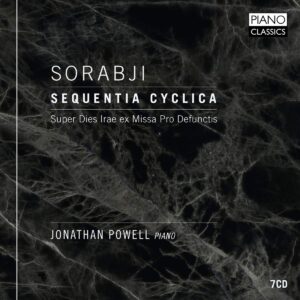Kaikhosru Shapurji Sorabji’s Sequentia Cyclica super Dies Irae (hereafter SC) is by far the longest of this composer’s multi-hour-long behemoths for solo piano to have been performed publicly, totaling nearly eight and a half hours on seven CDs via Jonathan Powell’s world-premiere recording. Composed between January 1948 and April 1949, SC is essentially a set of variations based on the 13th-century Latin chant Dies irae.
The variations encompass a wide range of forms, moods, and durations. Variation 17, for example, is relatively short and lyrically understated. The 10-minute-long No. 18, by contrast, abounds with declamatory chords in dotted rhythms, over which free-floating rapid right-hand runs merrily buzz. The 21-minute Variation 8 starts off as a genial waltz. Polytextual filigree soon begins to accumulate like clutter (as per usual with Sorabji, he just can’t help himself!), then subsides so that the waltz can reestablish itself, only to pile up again.
I liken the 50-minute Variation 4 to a novel without words: the long opening section unfolds in a steady procession of long legato phrases that progress from two- and three-part counterpoint to more complex linear strands that require multiple staves for clarification’s sake. As the note values become faster, the articulation also starts to vary, and the lines expand into octaves or fill out as chords. Polyrhythms start to emerge, eventually embedding within other polyrhythms and building to a climax. Then Sorabji starts a new chapter, this time intoning the Dies irae as a cantus firmus against the long legato lines, and plotting the inevitable multi-stave, multi-strand traffic to come with more dramatic concision.
Variation 22 encompasses a 97-minute-long yet grippingly sustained Passacaglia containing 100 of its own variations. The 80-minute wisp of a finale consists of five continuous fugues followed by a stretto and a coda. Each successive fugue has one more voice than its predecessor, evolving from the first fugue’s two-part textures up through the final fugue’s dazzlingly intricate six-voice interplay.
According to Powell’s extensively detailed annotations, Sorabji considered SC his best piano work–a debatable yet totally understandable point. Certainly the harmonic trajectory conveys much more of a sense of tension and release than in, say, the four-and-a-half-hour Opus Clavicembalisticum’s long stretches of vaguely bitonal sludge. With SC, however, Sorabji metes out simplicity and complexity in judicious proportion, and as such exerts a higher degree of control over his mammoth time-scale.
Following Jonathan Powell’s interpretation with the score, I am profoundly impressed not only by how the pianist accurately dispatches Sorabji’s gazillions of notes, but also in that he voices these notes with a level of specificity and tonal application that gives new meaning to the word “painstaking”. The delicacy of his pianism is informed by inner strength, while the fortissimo peaks and gothic-size slabs of chords never spill over into pounding or banging. Furthermore, the pianist’s intelligent, fluid pacing and astute scaling of dynamics address Sorabji’s architectural ambitions seriously, generating an immense sense of sweep and momentum throughout.
In short, Jonathan Powell makes a compelling and standard-setting case for SC that will be hard to equal, let alone surpass. My one quibble concerns the engineering: it does justice to Powell’s sonority and huge dynamic range, yet the overall ambience seems too dry and even a bit claustrophobic for music that cries out for resonant breadth. A stunning achievement.
































